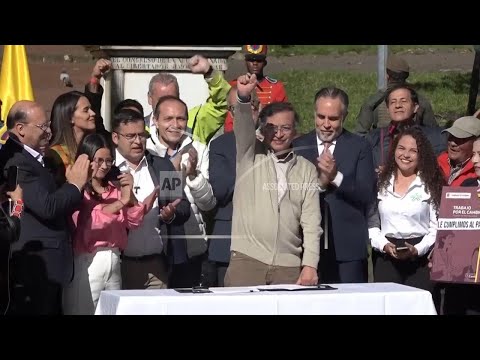(26 Jun 2025)
RESTRICTION SUMMARY:
ASSOCIATED PRESS
Bogotá, Colombia – June 25, 2025
1. Various of President Gustavo Petro arriving to sign the Labour Reform
2. Guest carrying a symbolic copy of the Colombian Constitution during the signing ceremony
3. Various of people during the signing ceremony
4. President Petro at the signing ceremony
5. President Petro signing the Labour Reform decree and holding the symbolic Constitution of Colombia
6. SOUNDBITE (Spanish) Gustavo Petro, President of Colombia:
"In the end, this law that I have just signed was approved. As soon as it is published, it will be in force throughout the country, throughout the nation."
7. President with ministers
8. SOUNDBITE (Spanish) Gustavo Petro, President of Colombia:
"We must elect a government (in the upcoming elections) that will uphold this law and enforce it, because now the big problem with the law, like many other current laws, is that they are not enforced. One way to evade the law is to leave it as a dead letter (not apply it), as they have left most of the Colombian Constitution as a dead letter."
9. Various of people at the signing Ceremony
STORYLINE:
Colombian President Gustavo Petro signed into law on Wednesday a labour reform that seeks to improve workers’ conditions by increasing overtime and limiting short-term contracts in search of greater stability.
For the government and the trade unions, the law will allow the recovery of rights that workers had at the beginning of the 1990s, when labour laws began to be made more flexible. Meanwhile, employers expect that it will increase operating costs.
The law was approved by a Congress in tension with the government, which pressed for a referendum if the legislators did not approve it. After the legislative victory, Petro backed away from the referendum, but is seeking to launch a process to reform the constitution in order to achieve the social transformations he promised.
Petro assured that the law is an advance because it recovers rights, but it did not manage to conquer others such as the extension of paternity leave or leave for incapacitating menstrual symptoms.
The law will change some conditions for workers, especially formalised workers who are employed by companies or state entities.
The law includes shortening the working day, limiting weekly overtime and increasing pay at weekends and on festive days.
Opposition congressmen and some trade unions opposed the changes, claiming that increasing the costs of formal employment would affect small businesses in particular, leading to higher unemployment.
AP Video shot by Marko Alvarez
===========================================================
Clients are reminded to adhere to all listed restrictions and to check the terms of their licence agreements. For further assistance, please contact the AP Archive on: Tel +44(0)2074827482 Email: info@aparchive.com.
Find out more about AP Archive: http://www.aparchive.com/HowWeWork
Twitter: https://twitter.com/AP_Archive
Facebook: https://www.facebook.com/APArchives
Instagram: https://www.instagram.com/APNews/
You can license this story through AP Archive: http://www.aparchive.com/metadata/youtube/15db52788cd44a47a7a420212809933b
Author: AP Archive
Go to Source
News post in July 1, 2025, 3:06 am.
Visit Our Sponsor’s:
News Post In – News





